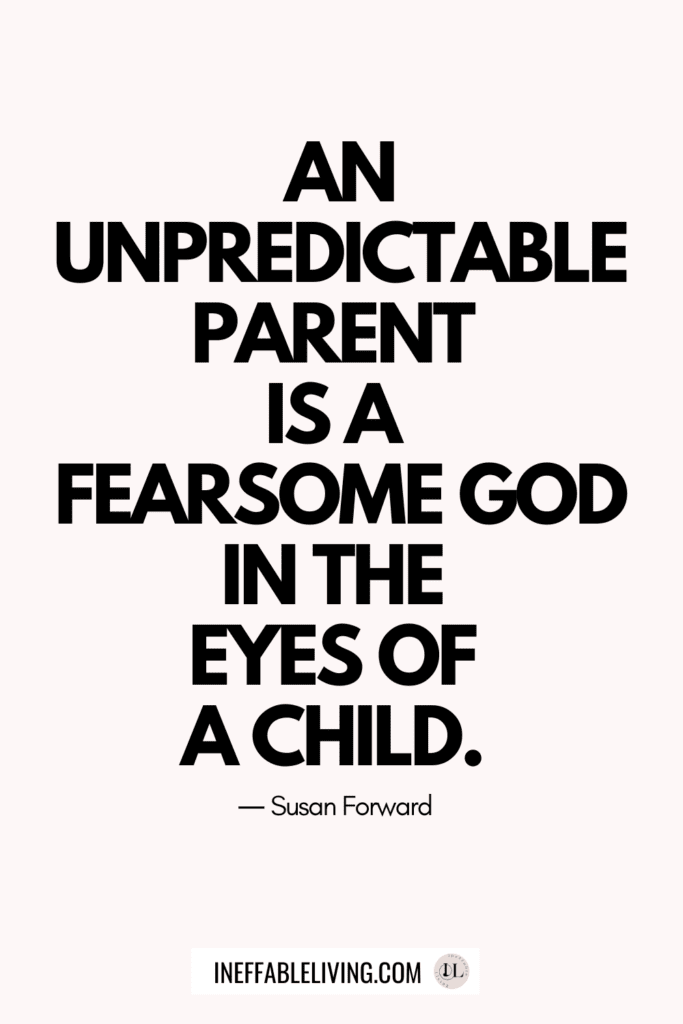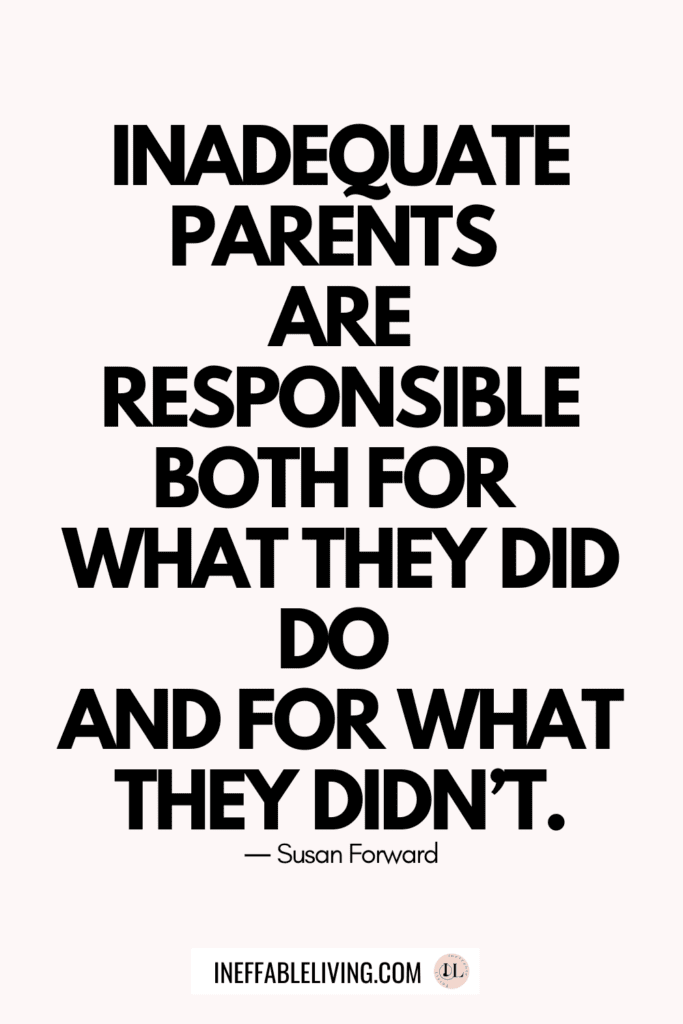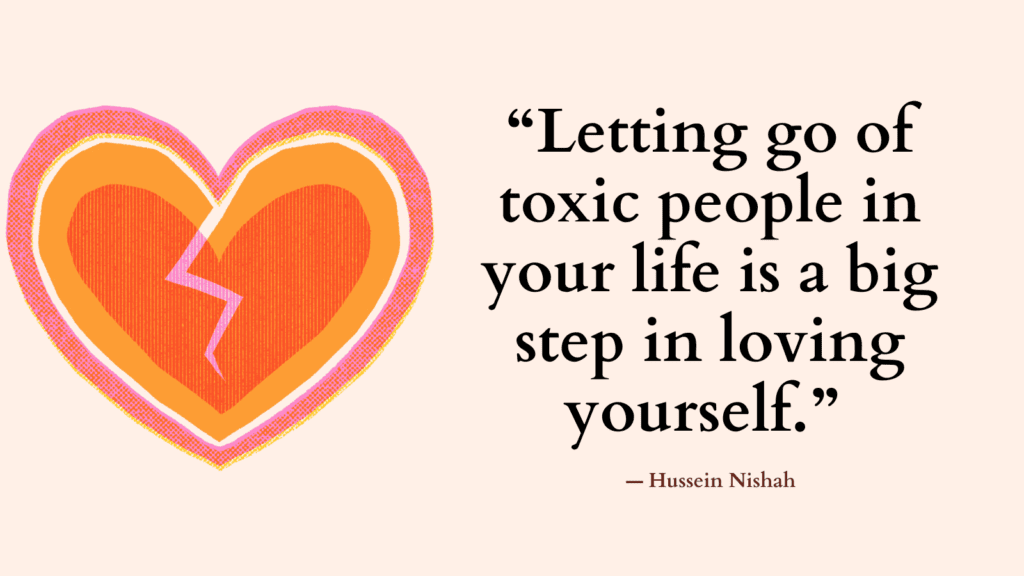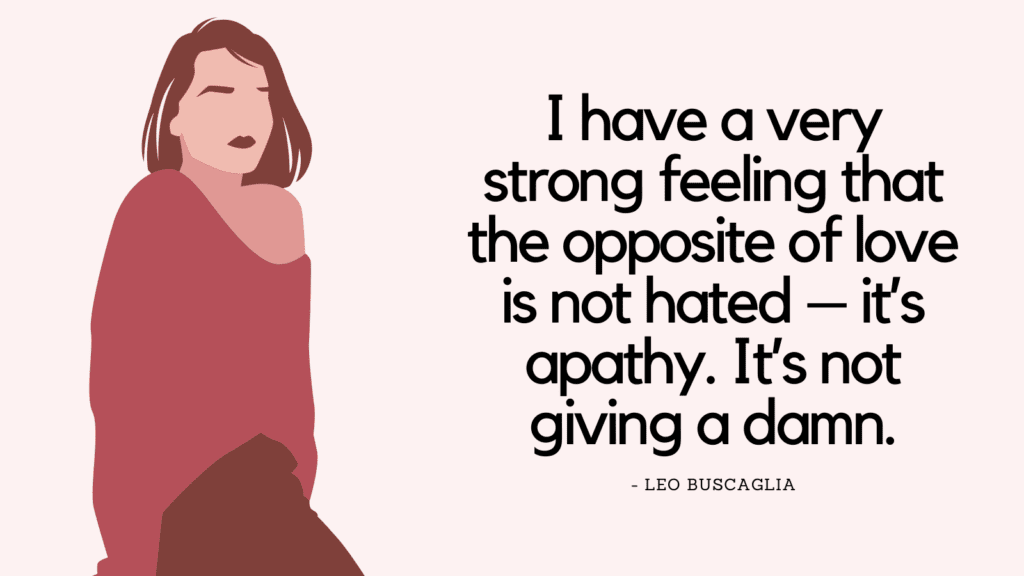This post contains some of the best toxic parents quotes.
Toxic Parents Quotes
1. “A child’s world is very narrow, and no matter how abusive, the parents still represent the only available source of love and comfort. The battered child spends his entire childhood searching for the Holy Grail of parental love. That search continues into adulthood. Kate, too, remembered: When I was a baby, my father would hold me, love me, and rock me. And when I was a little older, he was always there taking me to dance classes on the weekend or to the movies. He really loved me at one point in his life. I guess my greatest wish is for him to love me again the way he used to.” ― Susan Forward
2. “Abused children have a caldron of rage bubbling inside them. You can’t be battered, humiliated, terrified, denigrated, and blamed for your own pain without getting angry. But a battered child has no way to release this anger. In adulthood, that anger has to find an outlet.” ― Susan Forward
3. “Adult children of toxic parent have an especially difficult time with their anger because they grew up in families where emotional expression was discouraged. Anger was something only parents had the privilege of displaying.” ― Susan Forward
4. “All of us develop our expectations about how people will treat us based on our relationships with our parents” ― Susan Forward
5. “An unpredictable parent is a fearsome god in the eyes of a child.” ― Susan Forward
6. “As adults, they often become trapped in a vicious cycle of accepting responsibility for everything, inevitably falling short, feeling guilty and inadequate, and then redoubling their efforts. This is a draining, depleting cycle that leads to an ever-increasing sense of failure.” ― Susan Forward

7. “As long as you continue to react so strongly to them, you give them the power to upset you, which allows them to control you.” ― Susan Forward
8. “At the core of every formerly mistreated adult —even high achievers—is a little child who feels powerless and afraid.” ― Susan Forward
Related: Undermothered: How to Mother Yourself Using These Practical 10 Strategies?
9. “Children growing up in alcoholic homes are buffeted by unpredictable and volatile circumstances and personalities. In reaction, they often grow up with an overpowering need to control everything and everyone in their lives.” ― Susan Forward
10. “Children soak up both verbal and nonverbal messages like sponges—indiscriminately. They listen to their parents, they watch their parents, and they imitate their parents’ behavior. Because they have little frame of reference outside the family, the things they learn at home about themselves and others become universal truths engraved deeply in their minds.” ― Susan Forward
11. “Children who are not encouraged to do, to try, to explore, to master, and to risk failure, often feel helpless and inadequate. Over-controlled by anxious, fearful parents, these children often become anxious and fearful themselves. This makes it difficult for them to mature. Many never outgrow the need for ongoing parental guidance and control. As a result, their parents continue to invade, manipulate, and frequently dominate their lives.” ― Susan Forward
12. “Enmeshment creates almost total dependence on approval and validation from outside yourself. Lovers, bosses, friends, even strangers become the stand-in for parents.” ― Susan Forward
13. “In fact, not only have a good many formerly abused children grown into nonabusing adults, but a number of these parents have great difficulty with even modest, nonphysical methods of disciplining their children. In rebellion against the pain of their own childhoods, these parents shy away both from setting limits and from enforcing them. This, too, can have a negative impact on a child’s development, because children need the security of boundaries.” ― Susan Forward
14. “Inadequate parents are responsible both for what they did do and for what they didn’t.” ― Susan Forward
15. “Instead of promoting healthy development, they unconsciously undermine it, often with the belief that they are acting in their child’s best interest.” ― Susan Forward
16. “It’s amazing how people can change behind closed doors.” ― Susan Forward

17. “Kate summed it up: All my life, it’s been going through my mind that I don’t deserve to be happy. I think that’s why I never got married . . . never had a good relationship . . . never allowed myself any real success. When Kate grew up, the physical abuse ended. But through self-loathing, the emotional abuse continued. Except that now, she had become her own abuser.” ― Susan Forward
18. “Like a chemical toxin, the emotional damage inflicted by these parents spreads throughout a child’s being, and as the child grows, so does the pain.” ― Susan Forward
19. “Many toxic parents compare one sibling unfavorably with another to make the target child feel that he’s not doing enough to gain parental affection. This motivates the child to do whatever the parents want in order to regain their favor. This divide-and-conquer technique is often unleashed against children who become a little too independent, threatening the balance of the family system.” ― Susan Forward
Related: How To Heal From The Father Wound In 7 Steps (+FREE Worksheets)
20. “Most adult children of toxic parents grow up feeling tremendous confusion about what love means and how it’s supposed to feel. Their parents did extremely unloving things to them in the name of love. They came to understand love as something chaotic, dramatic, confusing, and often painful—something they had to give up their own dreams and desires for. Obviously, that’s not what love is all about. Loving behaviour doesn’t grind you down, keep you off balance, or create feelings of self-hatred. Love doesn’t hurt, it feels good. Loving behaviour nourishes your emotional well-being. When someone is being loving to you, you feel accepted, cared for, valued, and respected. Genuine love creates feelings of warmth, pleasure, safety, stability, and inner peace.” ― Susan Forward
21. “Most adult children of toxic parents grow up feeling tremendous confusion about what love means and how it’s supposed to feel. Their parents did extremely unloving things to them in the name of love. They came to understand love as something chaotic, dramatic, confusing, and often painful—something they had to give up their own dreams and desires for. Obviously, that’s not what love is all about.” ― Susan Forward
22. “No matter how toxic your parents might be, you still have a need to deify them. Even if you understand, on one level, that your father was wrong to beat you, you may still believe he was justified. Intellectual understanding is not enough to convince your emotions that you were not responsible.” ― Susan Forward
23. “Once you understand what love is, you may come to the realization that your parents couldn’t or didn’t know how to be loving. This is one of the saddest truths you will ever have to accept. But when you clearly define and acknowledge your parents’ limitations, and the losses you suffered because of them, you open a door in your life for people who will love you the way you deserve to be loved—the real way.” ― Susan Forward
24. “Parents who feel good about themselves do not have to control their adult children. But [toxic parents] operate from a deep sense of dissatisfaction with their lives and a fear of abandonment. Their child’s independence is like the loss of a limb to them. As the child grows older, it becomes ever more important for the parents to pull the strings that keep the child dependent. As long as toxic parents can make their son or daughter feel like a child, they can maintain control.” ― Susan Forward
FREE Mother Wounds Worksheets
25. “Perfectionist parents seem to operate under the illusion that if they can just get their children to be perfect, they will be a perfect family. They put the burden of stability on the child to avoid facing the fact that they, as parents, cannot provide it. The child fails and becomes the scapegoat for family problems. Once again, the child is saddled with the blame.” ― Susan Forward
26. “Remember, accepting blame is a survival tool for abused children. They keep the myth of the good family alive by believing that they – not their parents – are bad. This belief lies at the core of virtually all self-defeating behavior patterns in adults who were abused as children.” ― Susan Forward
27. “Secrets help toxic parents cope by turning their families into private little clubs to which no outsiders are admitted.” ― Susan Forward
Related: Best 15 Inner Child Exercises: How To Connect With Your Inner Child (& Heal Your Childhood Wounds)
28. “Strange as it may seem, many people are still controlled by their parents after their deaths. The ghosts that haunt them may not be real in a supernatural sense, but they’re very real in a psychological one. A parent’s demands, expectations, and guilt trips can linger long after that parent has died.” ― Susan Forward
29. “The “family secret” is a further burden for abused children. By not talking about the abuse, the battered child cuts off any hope of emotional help.” ― Susan Forward
30. “The family drama may look and sound different from generation to generation, but all toxic patterns are remarkably similar in their outcome: pain and suffering.” ― Susan Forward
31. “The only way emotional assaults or physical abuse can make sense to a child is if he or she accepts responsibility for the toxic parent’s behavior.” ― Susan Forward
32. “Unhealthy families discourage individual expression. Everyone must conform to the thoughts and actions of the toxic parents. They promote fusion, a blurring of personal boundaries, a welding together of family members. On an unconscious level, it is hard for family members to know where one ends and another begins. In their efforts to be close, they often suffocate one another’s individuality.” ― Susan Forward
33. “Verbal abuse is as damaging as physical abuse, and in some cases, it does even more damage to a child. Insulting names, degrading comments and constant criticism all leave deep emotional scars that hinder feelings of self-worth and personal agency.” ― Susan Forward
34. “We can only speculate why, but physically abusive parents seem to share certain characteristics. First, they have an appalling lack of impulse control.” ― Susan Forward
35. “What makes a controlling parent so insidious is that the domination usually comes in the guise of concern. Phrases such as, “this is for your own good,” “I’m only doing this for you,” and, “only because I love you so much,” all mean the same thing: “I’m doing this because I’m so afraid of losing you that I’m willing to make you miserable.” ― Susan Forward
36. “When a parent forces parental responsibilities on a child, family roles become indistinct, distorted, or reversed. A child who is compelled to become his own parent, or even become a parent to his own parent, has no one to emulate, learn from, and look up to. Without a parental role model at this critical state of emotional development, a child’s personal identity is set adrift in a hostile sea of confusion.” ― Susan Forward
37. “When we’re very young, our godlike parents are everything to us. Without them, we would be unloved, unprotected, unhoused, and unfed, living in a constant state of terror, knowing we were unable to survive alone.” ― Susan Forward
Related: Inner Child Wounds Test (+4 Attachment Imagery Exercises To Heal Inner Child Wounds)
38. “I also believe that forgiveness is appropriate only when parents do something to earn it. Toxic parents, especially the more abusive ones, need to acknowledge what happened, take responsibility, and show a willingness to make amends. If you unilaterally absolve parents who continue to treat you badly, who deny much of your reality and feelings, and who continue to project blame onto you, you may seriously impede the emotional work you need to do.” ― Susan Forward
39. “People can forgive toxic parents, but they should do it at the conclusion—not at the beginning—of their emotional housecleaning. People need to get angry about what happened to them. They need to grieve over the fact that they never had the parental love they yearned for. They need to stop diminishing or discounting the damage that was done to them.” ― Susan Forward
40. “It’s extremely frustrating when you’ve worked hard to get to the point of confrontation, but one or both of your parents are dead.” ― Susan Forward

How To Deal With Toxic Parents?
Dealing with toxic parents can be difficult and you may need to seek support from a therapist or other mental health professional. Here are some tips that may also help:
1. Set Boundaries
Establish clear boundaries for what behaviors are acceptable and unacceptable. Stick to your boundaries consistently and calmly communicate them to your parents.
2. Practice Self-Care
Take care of yourself mentally, emotionally, and physically. This can include exercise, spending time with friends, and engaging in hobbies and activities that bring you joy.
3. Seek Support
Surround yourself with a support system of friends, family members, or a therapist who can help provide emotional support and guidance.
4. Communicate Clearly
If you need to have a difficult conversation with your parents, try to communicate your feelings and thoughts clearly and calmly. Use “I” statements instead of blaming or accusing language.
5. Practice Forgiveness
Forgiveness is a personal decision and it can take time. If you decide to forgive your parents, it can help you let go of any resentment and move forward in a healthier way.
References
- Portions of this article were adapted from the book Toxic Parents, © 1989 by Craig Buck and Susan Forward. All rights reserved.



